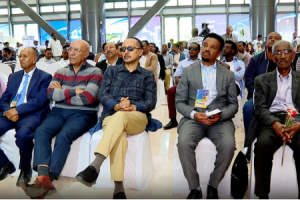
Ras Darge 
Nikolay Leontyev
As we turn the page of history, the battle of Adwa appeared to be one of the prominent incidents which might have changed the fate of Africa. Most of all, it was the victory of the black people against the colonial ambition of Europeans as they set protocols to scramble Africa in Berlin conference.

The battle of Adwa witnessed the mysterious magnetism among Ethiopians during the time of difficulty and inspired Africa and black people to emancipate from slavery. Had the Italians not been defeated at the battle of Adwa, it is believed that, Africans and black people around the world would not have been able to rise up and struggle against colonialism and would have been expelled from their lands.
Adwa brought together not only warriors and knights, but it was the combination of the clergy, the government, and the peasantry, singers of elegy, men, and women from every corner of the country.
While there are many heroes who made history in the battle field, there are also other unsung heroes who made key contributions for the success of the army at the war front.
According to an article ‘Women and the Battle of Adwa’ published on ENA, women marched alongside men to the battle field at Adwa 123 years ago not as “comfort women”, but to fight against the Italian army that was humiliated by a black African power.
Adwa, the very first decisive victory of a black African power, is an important event in the shared memory of the entire African population. It demonstrated the spirit of unity, love and friendship among Ethiopians; but foremost, it showed the genuine role of women.
Just like their men-folk, Ethiopian women were ready to sacrifice their lives to prevent colonialists from sneaking into their country, thus forcing their children to live in servitude.
For instance, Empress Taytu Bitul is clearly a symbol of all the patriotic qualities of women, according to many historians. In his book “Battle of Adwa: Reflections on Ethiopia’s Historic Victory Against European Colonialism”, Paulos Milkias, said that Empress Taytu was not only a diplomat and stateswoman with resolve, but also an ingenious commandant versed in the art of war, a tactician par excellence.
Apart from confronting the invading force in the north, there had also been figures of the time in keeping and maintaining stable administration in different parts of the country while the emperor was in charge of leading the Ethiopian force.
Documents revealed that there had been prominent persons who had played crucial role in looking after the security in different parts of the country in the absence of the Emperor. Before he left Addis Ababa, the Emperor ordered Ras Darge, Dejazmach Haile Mariam and Wehni Azzaj Weide Tsadik to remain behind and look after the state administration and security. These men had discharged their responsibility in that critical time
The other heroic personalities of the time consisted of the leaders and their troops assigned to look after boarder security. Abba Jifar of Jimma, Dejjazmach Gebre Egziabhere of Leqa-Wellega, Dejjazmach Jote and Kawo Tona of Welayitta are unforgettable in keeping order in the south western Ethiopia, according to an article ‘The Battle of Adwa: Brief History on Military Logistics and Winning Strategy’ by Tsegaye Tegenu (PhD).
There was also a group of the imperial army sent to open another front on the eastern front. While at Wichalle (Wello), the Emperor sent a message to Ras Weide Giorigis, governor of Kefa and Ras Tesemma, governor of lIubbabor who had stayed behind, to march to Awsa (eastern boarder) instead of coming to meet him at Ashenge. Emperor Menelik sent forces to the eastern border, for Italy had begun to supply local forces with guns and artilleries to instigate internal rebellion.
Moreover the battle had also involved individuals from abroad, one of the gear shifter of the war in Ethiopia was Russian born Nikolay Leontyev. Leontiev had dreamed of going to Ethiopia and for many years he collected information about the country.
According to an article ‘How Russia assisted Ethiopia against colonial occupation’ by Nikita Btutrlin, stated that in October 1890 Menelik II, officially protested against the Italian claims. In order to emphasize the independence of Ethiopia, he announced his accession to the heads of all European powers, including the Emperor Alexander III of Russia. In his reply, the Tsar reassured Menelik of his support to the fellow Orthodox Christians and suggested maintaining formal political contacts through Lieutenant Victor Mashkov, who directly reported to the Russian Emperor on his trips to Ethiopia.
The positive stance of Russia towards the Ethiopian government contributed significantly to Menelik’s confidence in his ability to confront the Italians stated the same article. On February 24, 1893, Ethiopia denounced the Treaty of Wuchale. In response, Italian troops invaded the Ethiopian territory beyond the agreed borders. From the first days of the war, St. Petersburg took a firm stand in defense of Ethiopia.
This was reasoned by both the desire to help the right and the weaker side, and also by the interest of Russia in restraining colonial ambitions of the Great Britain and Italy in the Horn of Africa. In addition to geopolitical concerns, Ethiopia was perceived in Russia as an Orthodox country of great spiritual significance to the Christian world.
In 1894, the Russian Geographical Society sent an expedition to Ethiopia, which was led by a retired officer Nikolay Leontyev and included archimandrite Efrem of the Russian Orthodox Church, doctor and anthropologist A. Eliseev and artillery officer K. Zvyagin. This mission was well received by Menelik II, who appointed N. Leontyev his close adviser on foreign policy and defense, as well as a focal point for his relations with Russia.
At the war council convened at Menelik’s palace in March 1895, N.Leontiev outlined the general tactical scheme of the campaign against Italy, which suggested avoiding direct assaults on the Italian fortifications, and instead luring the enemy troops deeper into the country, weakening them by night raids and using the advantages of terrain against the Italian artillery.
On July 5, 1895, a large Ethiopian diplomatic delegation headed by Menelik’s cousin Ras Damtew arrived in St. Petersburg where it was received “with honors more lavish than those accorded any previous foreign visitors in Russian history”.
Additional sources indicate that the presence of the Russian advisers at the battle of Adwa helped the Ethiopians achieve victory.
The Ethiopian Herald February 27/2020
BY LAKACHEW ATINAFU





